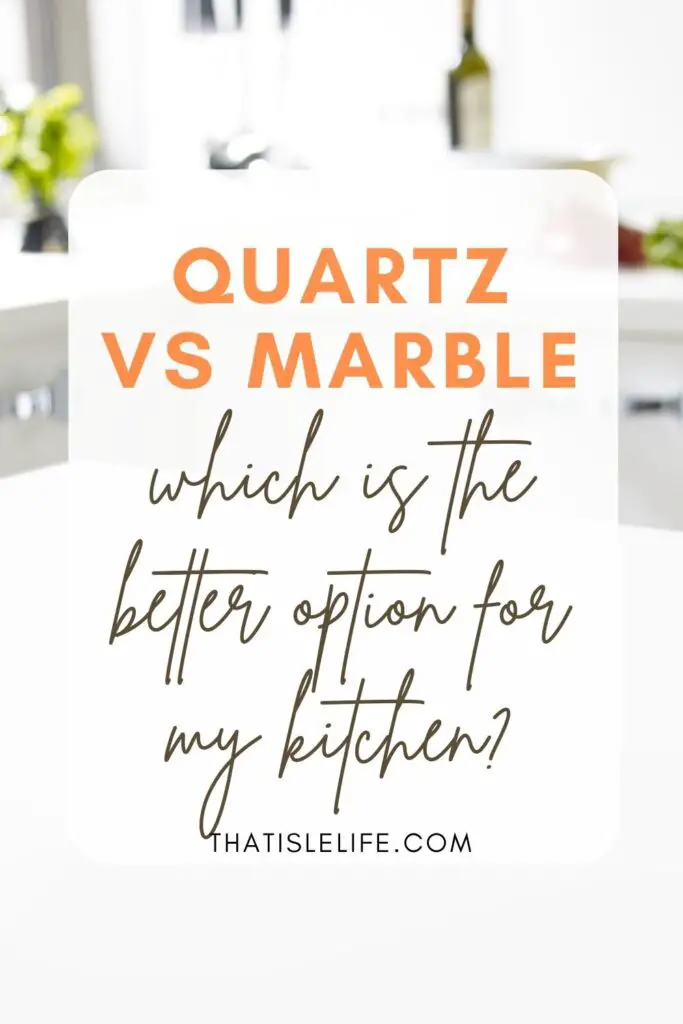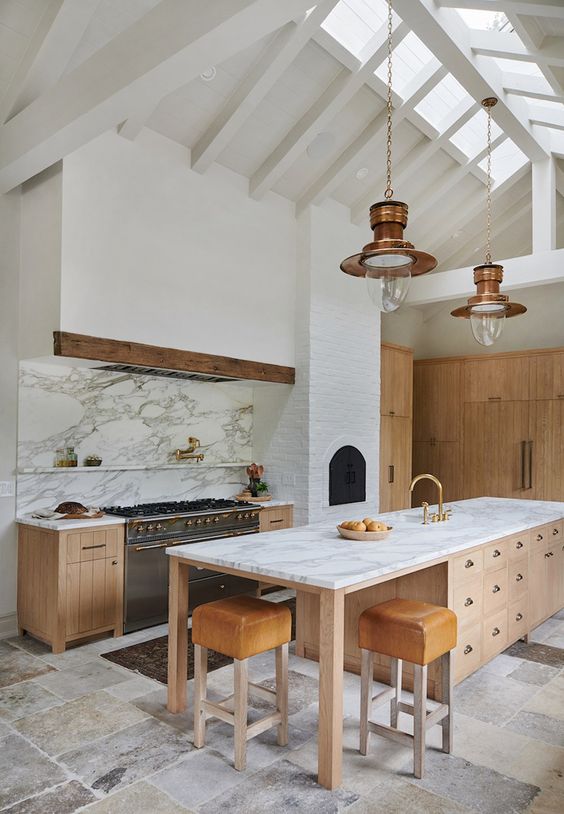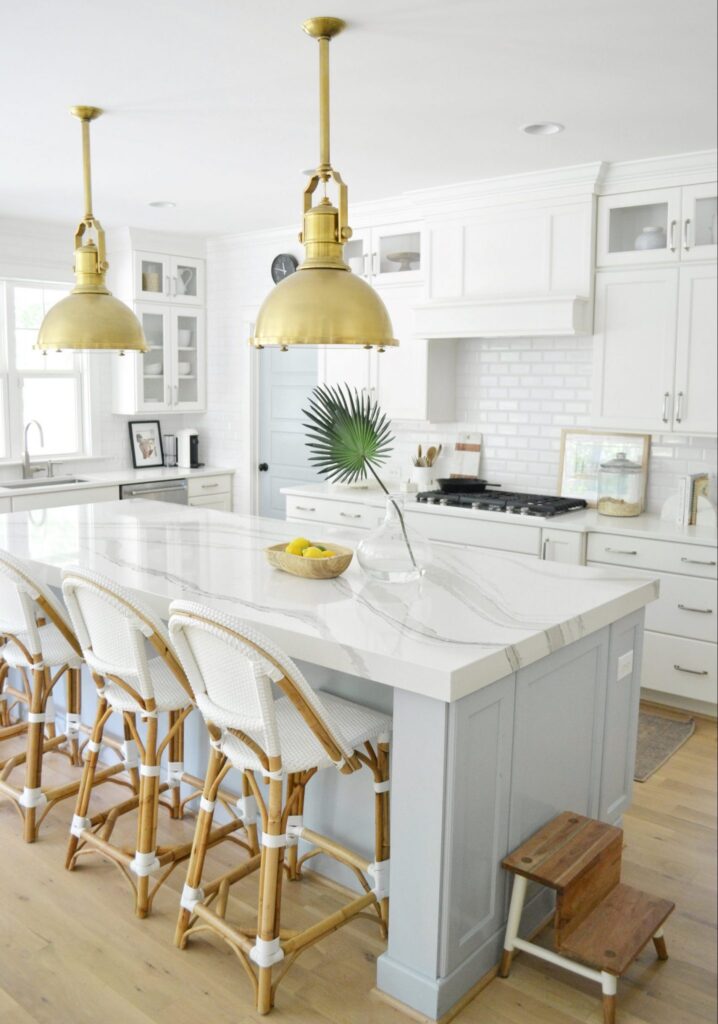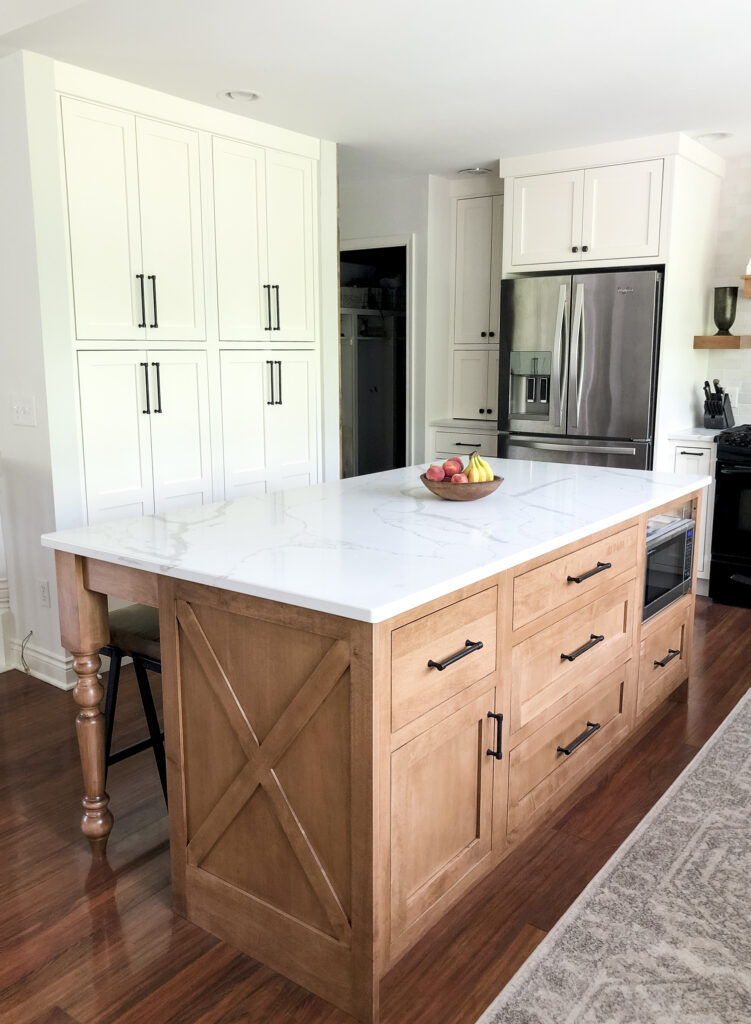People often consider quartz vs. marble for their kitchen countertops. Although they look similar, do you know the major differences between these two materials? And, which is the better option for your kitchen?
When we were renovating our kitchen three years ago, I asked myself the popular question – quartz vs. marble countertops?
I love the look and feel of a marble countertop. But, people have told me that quartz countertops are far more durable and easy to maintain.
To be honest, I didn’t have the time nor energy to conduct extensive research between the two materials back then. So I settled on what I liked best, and that was a marble countertop.
After three years, it’s safe to say that I semi-regret that decision. Don’t get me wrong, I still love my marble countertop. It’s one of my favorite elements of the kitchen.
However, I love it so much that I don’t want to ruin it. It was supposed to double up as a breakfast counter, but I have avoided using it because I don’t want any scratches, stains, or etching!
I know that sounds completely impractical because a kitchen is supposed to be functional. I just hate the thought of marking something so beautiful (and expensive!)
Anyway, it got me thinking if I would choose marble again if I could re-do my entire renovation. So, I looked up both materials and decided to write this post to help all of you who are building or remodeling your kitchens.
In this post, I will share with you everything I’ve discovered about quart vs. marble. Read on to find out more about:
- What is marble?
- What is quartz?
- Examples of quartz
- Pros and cons of quartz countertops
- Pros and cons of marble countertops
- How to care for quartz countertops
- How to care for marble countertops

Related to Quartz vs Marble:
- Wicker vs Rattan – What’s the difference and why does it matter?
- Blinds vs Curtains: Which Window Treatment Is Better For Your Home?
- Terrazzo vs marble – Which is the better option for your home?
- Cane vs Rattan – What’s The Difference and Why Is It Important?
What is marble?
Marble is a natural stone that is produced through the crystallization of limestone. The final result is a stone that has different veins on each piece, making them very unique.
According to Homedit, its name is derived from Greek words that mean shining stone. Marble reflects light beautifully and therefore has a beautiful shine or gleam to it. Its luster is often associated with luxury.
What is quartz?
According to Brittanica, quartz is a mineral of many varieties that consists primarily of silica, or silicon dioxide. However, quartz countertops are made from roughly 90% natural quartz and 10% polyresin. As a result, a quartz countertop is known as a manmade stone and is also known as an engineered stone.
Examples of quartz
Quartz is a popular material when it comes to constructing kitchen countertops. But, they have many other uses as well including making:
- Jewelry and gemstones
- Glass
- Watches and clocks
- Ceramics
Pros of quartz countertops
Durable
Since a quartz countertop is an engineered stone, it is less porous than marble, which means it is scratch, heat, and stain-resistant. Because quartz countertops are very durable, they are less likely to show wear and tear marks over the years.
Affordable
Quartz is affordable and provides great value for its look and attributes. They cost an estimated $55 to $75 per square foot, which is slightly cheaper than marble.
Consistent in color and pattern
Since quartz countertops are manmade, they are usually consistent in color and pattern. Therefore, quartz countertops usually have a seamless and polished finish after installation.
Easy to maintain
Quartz countertops are one of the easiest materials to maintain. They do not require any sealing or waxing and can be easily cleaned with water, mild soap, and a sponge.
Cons of quartz countertops
Cannot withstand high levels of heat
Although quartz countertops are very durable, they can be damaged by quick changes in temperature. Setting a hot pan or pot on a quartz countertop without a trivet can damage the surface.
Cookie-cutter look
The consistent pattern of quartz countertops can give the kitchen a cookie-cutter look. Since they do not have unique veins, all quartz countertops look the same.
More difficult to install
Quartz countertops are heavier and more difficult to install. As a result, labor costs for installation are usually higher than marble.
Pros of marble countertops
Beautiful and unique
Marble is a very beautiful stone that is often associated with luxury. Each marble slab has its own unique veining, making each piece truly special.
High resale value
Marble typically has a higher resale value compared to quartz. However, it is important to note that a home’s resale value doesn’t depend entirely on kitchen countertops.
Natural stone
Marble is a natural stone, which means it comes directly from the earth. It doesn’t require any power or energy to produce the material.
Cons of marble countertops
Less durable
Because marble is a natural stone, it is less durable than quartz. It is more porous, which means it’s susceptible to stains, burns, and scratches.
Besides that, marble is softer and etches with use. Etching leaves a colorless watermark left on marble. Marble also ages over time, so it will never look as new as quartz even with proper care.
Costly
Since natural stones require more effort to extract, marble countertops are more expensive than quartz countertops.
Difficult to maintain
It is important to wipe any spills immediately to prevent any stains. Since marble is porous, it needs to be professionally sealed after installation. Additionally, marble needs to be regularly sealed at least 2-3 times a year once the initial sealant wears off.
How to care for quartz countertops
Quartz may be a hardy material, but they require proper care to last a long time. Here are some ways to care for quartz countertops:
- Clean your quartz counterstop regularly with a soft cloth, mild soap, and water. Do not use abrasive soaps or highly acidic or alkaline chemicals.
- Try to wipe all spills especially from colored liquids immediately.
- Use hot pads or trivets for pans, pots, and other types of cookware.
- Use cutting boards and avoid cuting directly on a quartz surface to avoid scratches.
- Avoid pressure or force on your countertops, as it can chip or crack the surface.
How to care for marble countertops
Marble countertops are less durable than quartz countertops, therefore they need extra care and attention. Here are some ways to care for marble countertops:
- Protect the surface by sealing it after installation.
- Clean it daily with water, a soft cloth, and gentle soap. Do not use abrasive soaps or highly acidic or alkaline chemicals.
- Seal it regularly to maintain the surface.
- Clean all spills immediately.
- Avoid placing hot cookware or tableware on top of it.
- Avoid placing anything acidic like lemons and vinegar on the surface.
- Seek professional help to refinish the stone if all else fails.
I hope this post has helped you to decide between quartz vs. marble countertops! Whichever you choose, always treat both materials with care and respect, so they will last for a long time.





